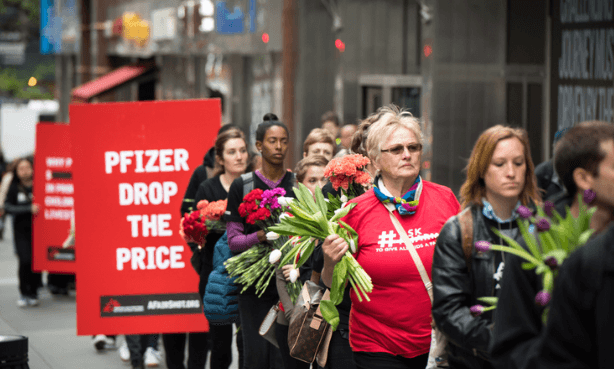
GlaxoSmithKline (GSK) and Pfizer are amongst the pharmaceutical companies that insist they are doing what they can to help the world cope with the global refugee crisis. But according to the humanitarian aid group, Doctors Without Borders/Médecins Sans Frontières (MSF), these companies’ obstinacy in lowering their price for critical vaccines at refugee camps in Greece is putting children at risk.
MSF put volunteer doctors to work in Greece when the humanitarian crisis in that country exploded last year, due largely to the influx of Syrian refugees fleeing their country’s ongoing civil war. In five Greek islands, on the country’s border with Macedonia and in Athens, MSF provides a bevy of services, including mental health consultations, immediate care for victims of torture and the delivery of basic healthcare.
But the key focus for MSF is immunizations. The lack of healthcare access in Afghanistan, Iraq and Syria made it nearly impossible for many families to vaccinate their children. The crowded and often unsanitary conditions at these refugee camps put them at risk for rapid disease outbreaks. Add the trauma and exhaustion suffered by many of these refugees, and the chances of life-threatening illnesses sweeping through these settlements becomes even higher. To that end, MSF said it has vaccinated at least 5,000 children, from the ages of 6 months to 15 years, across these camps since May.
The problem, however, is that while most pharmaceutical companies have long agreed to sell their vaccines and medicines to developing countries at a highly discounted rate, the same policy has not applied to middle- and higher-income countries trying to cope with this ongoing crisis.
[embed]https://www.instagram.com/p/BH2LtCCD9wR/?taken-by=forcedfromhome[/embed]
Most critical, according to MSF, is for pneumonia vaccines (PCV) to be sold at a rate at or near the lowest available rates sold on the global market. Governments of poorer nations can purchase such vaccines for as low as $3.10 a dose. But because such pricing is not available in Greece, MSF claims each dose costs 60 euros (US$68) at local pharmacies. MSF says it cannot purchase the vaccines through Gavi, the international organization that works with pharmaceutical firms to price vaccines at a far more affordable rate.
MSF pressed the issue with an online petition, signed by over 400,000 people, that asked pharmaceutical companies to lower the price of their pneumonia vaccines. The NGO said its representatives personally delivered copies of that petition to Pfizer and GSK at their American and Europen offices.
So far, however, neither company is budging. GSK, for example, already declared that it would not lower its price any further. GSK claims that its PCV, Synflorix, is already priced at $9.15 per child ($3.05 a dose, as a child must be inoculated three times in order for the vaccine to be effective). MSF requested the price drop globally to $5 for the full course of doses, but GSK said that would mean it would have to sell and distribute that vaccine at a loss. The company says it has already entered into a three-year agreement with MSF to supply Synflorix for use in refugee camps.
While the world has turned its attention elsewhere since the refugee crisis dominated the newswires last fall, this human rights crisis is far from going away. The Christian Science Monitor, in fact, reported that while far fewer refugees are attempting to cross from Turkey into Greece, a spike in the number of North Africans attempting to cross the Mediterranean is underway. Big Pharma, NGOs such as MSF, governments and the United Nations must arrive at consensus on countless challenges the refugee crisis presents the world. And preventing communicable diseases from spreading, and treating children who had no say in leaving their homes, has got to be at or near the top of this list.
Image credit: MSF/Edwin Torres

Leon Kaye has written for 3p since 2010 and become executive editor in 2018. His previous work includes writing for the Guardian as well as other online and print publications. In addition, he's worked in sales executive roles within technology and financial research companies, as well as for a public relations firm, for which he consulted with one of the globe’s leading sustainability initiatives. Currently living in Central California, he’s traveled to 70-plus countries and has lived and worked in South Korea, the United Arab Emirates and Uruguay.
Leon’s an alum of Fresno State, the University of Maryland, Baltimore County and the University of Southern California's Marshall Business School. He enjoys traveling abroad as well as exploring California’s Central Coast and the Sierra Nevadas.














